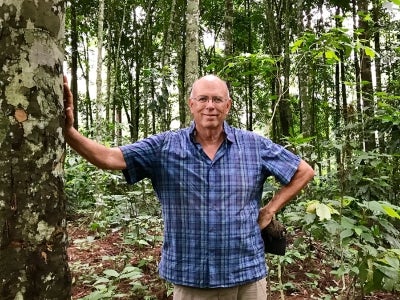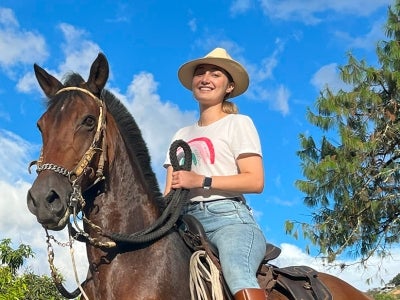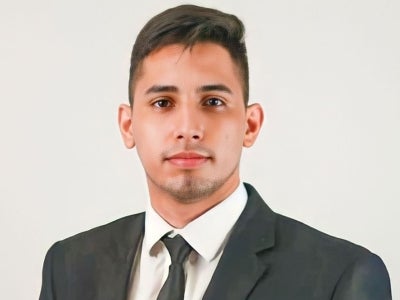
Karin Kemper on a boat near Kalimantan, Indonesia
Karin Kemper is the Global Director of Environment, Natural Resources and Blue Economy at the World Bank, and a member of the Global Environment Facility’s COVID-19 Task Force. In an interview, she reflected on the ways GEF financing has opened the door to innovative solutions to both environmental and development challenges and shared her advice to young people contemplating a career in the development and environment field (“go for it”).
What do you do for a living?
I am the Global Director for Environment, Natural Resources and Blue Economy at the World Bank. The ENB Global Practice provides financing, technical assistance, and knowledge solutions in areas such as pollution management, forests, landscapes, biodiversity, a healthy ocean economy and environmental policy, as well as environmental risk management. We also house the World Bank Group’s GEF Coordination Unit.
The World Bank Group was one of three founding partners of the GEF. Today - some $5 billion and 30 years later - we remain a key implementing agency, using GEF grants to help governments, businesses, and people better manage their natural resources and enable cleaner, greener economic growth. Through its emphasis on piloting, innovation, risk-sharing, and policy reform, GEF financing lays the groundwork for scaled-up investment in the environment and helps unlock financing from other sources while also overcoming investment barriers. The World Bank Group has mobilized an additional $40 billion for GEF-supported projects that support the global environment since 1991, and we look forward to continuing to scale up our ambition as the GEF’s eighth replenishment round gets underway in the coming months.
Is there a GEF-supported project that is close to your heart?
One example is the Ethiopia Sustainable Land Management (SLM) project, comprised of a series of two operations, which were implemented over a 12-year period (2008-2019) and used an inclusive, community-based approach to break the cycle between land degradation and poverty in a fragile area. The two SLM operations, supported with approximately $130 million in financing, including $17.3 million from the GEF and $4.6 million from the LDCF, resulted in about 900,000 hectares of land being sustainably managed, benefiting some 741,000 households. This project led to better water access, less soil erosion, improved food security, higher yields, and more diversified sources of income, resulting in more resilient livelihoods. Given the project’s success, it is being scaled up across Ethiopia with assistance from the World Bank through projects such as the Climate Action through Landscape Management Program for Results. We are also replicating this work in other countries, taking what we learned and benefiting other communities. This is just one example of how the World Bank and our client governments use GEF financing as the foundation upon which much larger programs are then built.
You are a member of the GEF’s COVID-19 Task Force. Why is this work important?
The GEF’s COVID-19 Task Force is examining the impact environmental degradation has on emerging infectious diseases and how future risks associated with these diseases can be prevented in the future. These findings will help shape future GEF investments in the areas of biodiversity, land use change, land degradation, illegal wildlife use and trade, agriculture, climate change, among others, as key parts of a One Health approach. In particular, I hope that the work of the Task Force will help ensure that nature-based solutions are central to programming in the GEF’s next replenishment cycle, GEF-8, as we work to decrease the risk of future emerging zoonotic infectious diseases.
How has COVID-19 impacted your work?
With the COVID-19 outbreak and travel restrictions, I really miss having the opportunity to meet with country clients face-to-face and visit projects directly and see their impact on the ground. Many years ago I telecommuted for a couple of years so I am used to working and conducting meetings online, but I do find visiting clients and seeing project results first-hand to be the best way to fully understand the challenges clients face, and to find workable solutions to those issues.
 Karin Kemper with colleagues viewing a project model in India
Karin Kemper with colleagues viewing a project model in India
Do you have a ‘typical’ workday?
During the pandemic, I have tried to schedule my workday so that most online meetings and events are finished by the late afternoon so I still have time to work on pending emails and documents and prepare for the next day. It doesn’t always work that way, but at least that is the ambition. I also try to do some audio meetings while walking my dogs so that I get to move around and not just sit at my desk. Wearing a mask while on the phone muffles the sound a bit, but the benefit of movement and getting fresh air outweighs that small inconvenience.
How did you first get into the field?
I knew from an early age growing up in Germany that I wanted to work in development. In high school, I was an exchange student in Brazil and saw for the first time the extent of a developing country’s needs. This experience had a big impact on me personally and was a deciding factor in my decision to choose a field that would make a difference in peoples’ lives, as well as the environment. It led me to pursue a career in water resources management, where I first worked on the economics and the institutional frameworks required to bring about better water resources management.
What life lessons has your work life taught you?
My work life has taught me the importance of persistence – never giving up. We live in a complex environment and many times one needs to try out multiple avenues in order to achieve innovation and results.
The state of the global environment can be overwhelming. What gives you hope?
Young people – their engagement and commitment to the environment, as well as their fearlessness – really do give me hope. Young people rightly recognize that their future is tied to the planet’s health. I’ve been particularly impressed by the persistence of people like Greta Thunberg and the Fridays for Future climate movement and their ability to raise awareness and catalyze action on critical climate issues.
What advice would you give to a young person who is thinking about pursuing a career in environmental conservation or protection?
I would tell them to go for it. Young people are really leading the way and developing solutions that are both innovative and imperative. Their engagement is critical.


